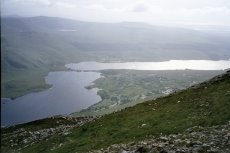
The Donegal Gaeltacht - the view from Mt. Errigal
It is now just under two weeks since I handed in my last two essays, putting an end to Semester #2 of my MA in International Relations. I suppose I haven't really finished until I get my results, so I probably shouldn't count my chickens just yet. But in any case, it's a relief just to have everything handed in. I'm not back in college until September. Now it's time to enjoy my summer.
The final week of college was pretty tough going. I had 5,000 words to write on post-communist democracy in Hungary and Bulgaria for the Thursday, and another 3,000 words to write on neo-liberal economics in Jamaica for the Friday. I took the week off work and totally immersed myself in the material. It was pretty hard work, but I enjoyed it in a funny way. It's fascinating stuff. Even though my head was wrecked and I wasn't getting enough decent food, enough human contact, or enough sleep, I still found it pretty interesting to read and write about these issues.
But more than once, I asked myself why I was bothering. What was I thinking, signing up for this kind of effort? The weather was beautiful that week (it probably looked far nicer from inside the library, of course), and I could have been sitting in a beer garden somewhere. So why do we put ourselves through this ordeal?

College - why bother?
A lot of people ask me about that too. Usually the questions are about what I can do with my qualification at the end of the day – what kind of job I’ll get, and whether I’ll follow up on my course. Sometimes there seems to be a presumption that the point of doing the course is to improve your own prospects. I’d be lying if I said that I had never considered that side of things, but there has to be more to it than that.
I am reminded of a friend of mine who spent some time studying in a college in Colombia, in South America. I was struck by something he once said to me. He told me that out of all of the Colombian students that he knew, every one of them wanted to use what they learned in college to improve their country. Their goal was to find some way to contribute to their society by applying their academic knowledge. This is pretty different to the situation in Ireland, where people generally seem to have a less altruistic approach to the university experience.
One problem I can see with the modern Ireland is a very individualistic culture. People seem to be less involved in community organisations and voluntary activities. It’s all tied up with consumerism – people’s aspirations are tied up with wealth, and property and car ownership, rather than taking an interest in their own society. I think that television compounds this problem by sucking up a lot of people’s time.
Ireland’s Celtic Tiger economy has meant a huge societal change, and Ireland is being held up as an example of successful development in the modern era. But not everybody agrees that it’s all good in 21st century Ireland. At the moment I’m reading a
critique of the Celtic Tiger by one of my lecturers in DCU, Peadar Kirby. He identifies some of the negative aspects to the new society.

Homelessness in Dublin
Of course, if I ever get carried away with criticising the negative side of modern Ireland, there are plenty of people who will bring me back down to earth. Of course we shouldn't forget the huge problems of the 1980s – long-term unemployment, emigration etc. – which were improved by the economic growth of the 1990s. But it is important not to take everything for granted, and to keep a critical eye on the nature of Irish development.
Anyway, this is a very long-winded way of saying that in my studies, I hope to try and look towards the wider problems of society. Andrew Linklater, who is one of the major International Relations theorists, has identified the three main themes of the discipline as Power, Order, and Emancipation. In my studies so far my definite focus has been, and will be, on the third of these. As far as I can see, the world is a pretty unfair place. In doing this Masters, my hope is to try to start understanding how and why it is so unfair, and if possible, to try to identify some ways to try and address the imbalance. A tall order?? Nah… No bother…


1 comment:
You did Bulgaria? So did I, together with Poland and the Czech Republic. We must compare and contrast sometime.
Post a Comment